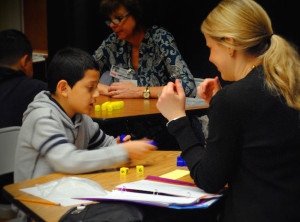Filling the International Skills Gap, Together
July 21, 2015
By Emily Elliott
Executive Director
A recent commentary in Education Week by Christopher T. Cross made the case for rigorous educational standards in the United States. Under the banner “Common Core,” we have seen rigorous standards face some degree of controversy, but few would argue against holding a high bar of excellence for United States citizens, especially paired with statistics showing the U.S. is slipping in international metrics.
Cross cites that the U.S. tied for last place of 22 nations in numeracy and ranked 20th in literacy in a recent study. He asks, “How will we assure the continuation of our democracy if citizens are unable to analyze complex information and data when they vote and participate in civic affairs?”

A third grade Heart student learns the parts of numbers up to 10 through hands-on activities, under guidance of volunteer tutor.
At Heart Math Tutoring we are sometimes asked by nervous volunteer recruits, “Is your curriculum… Common Core?… or, ‘New Math’… or the new way of teaching?”
We address these concerns by explaining that the math our volunteers deliver is so basic (counting, more vs. less, parts of numbers) that tutors won’t encounter the concepts that some parents have complained are overly complex in “the new Common Core.” (Truly, anyone can deliver the lesson plans Heart Math Tutoring provides; sign up to tutor today.)
However, this is a shortcut answer. The real answer is deeper and important to our citizenry: we need to consider that the “old school” way many of us were taught math does not actually foster number sense.
At Heart, we hate that it is widely socially acceptable to declare, “I am not a math person” often followed by “give me a calculator, what is the tip” or a shared laugh over basic counting mistakes. Fortunately we have not gotten to this point in literacy; it would be rare to hear someone announce, “Oh, I’m just not a person who knows how to read.”
One of our board members at Heart often suggests that adults who are good at math today likely are not that way because of their schooling but rather re-taught themselves how numbers work at an early age. In a New York Times Magazine article, “Why Do Americans Stink At Math?” Elizabeth Green shared the story of 12-year-old boys in Brazil who sell coconuts for 35 cruzeiros each and calculate total and change, but when they are presented with a written multiplication problem with a factor of 35, they are lost. The article concludes that a cause of innumeracy is school itself.
The good news is that regardless of how the familiar but “old school” teaching methods mess it up, the number system actually does make sense. At Heart we’ve learned from great educators who can break the concepts down and build up our nation’s numeracy skills.
Cross tells us, “Parents must accept the fact that students today may well be taught math that is more advanced than what they learned in the past” and recommends that we “Agree that education needs to change to keep up with the needs of our economy and workforce-just because it was done one way in the past does not mean that is the right way now.”
Cross closes with a final recommendation that rings loud:
“Accept the fact that schools cannot go it alone. Communities are rich with resources that can help students prepare to learn and succeed. Schools should be seeking out their community partners.”
When it comes to numeracy, many students from economically disadvantaged backgrounds are entering elementary school without the hands-on experience with numbers needed for true understanding and success in math. Working one-on-one and using Heart’s lesson plans, community volunteers can help students build understanding and meet the rigorous standards not only of K-12 education but also of our democracy and global economy.
About Heart Math Tutoring
Heart Math Tutoring is a math intervention program that recruits, trains, and supports volunteers to work as tutors in high-poverty elementary schools in Charlotte-Mecklenburg Schools. Hundreds of community members spend one hour each week delivering Heart’s research-based, structured curriculum. Sign up today!
Categories
- Blog (252)
- Events (28)
- Grants and Funding News (33)
- Heart Families (9)
- Heart News (152)
- Heart Staff (16)
- Math Matters (38)
- Press (65)
- Student Spotlight (1)
- Uncategorized (43)
- Volunteer Partners (12)
- Volunteer Resources (41)
- Volunteer Spotlight (52)
Recent Posts
- 2025 Volunteer Appreciation Month Spotlight Series
- Tutor Spotlight: LaShurn Purnell
- 2024 NAEP Results
- Heart Featured on Charleston’s Live 5 News
- Racing to 100 Tutors Across the Carolinas!
- Accelerate and Johns Hopkins University Visit HMT Tutoring Session
- Tutor Spotlight: Libby Anderson
- Tutor Spotlights: Alyson and Michael Fotia
- Heart Featured on Winston-Salem’s WXII 12 News
- Volunteer with Heart!

